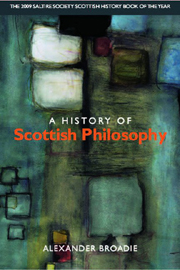Book contents
- Frontmatter
- Contents
- Acknowledgements
- 1 Introduction
- 2 John Duns Scotus
- 3 The Fifteenth Century
- 4 The Circle of John Mair
- 5 Humanism and After
- 6 Scotland Moves into the Age of Enlightenment
- 7 David Hume
- 8 Adam Smith
- 9 The Scottish School of Common Sense Philosophy
- 10 The Nineteenth Century: Ferrier to Seth
- 11 Realism and Idealism: Some Twentieth-century Narratives
- 12 Conclusion
- Bibliography
- Index
1 - Introduction
Published online by Cambridge University Press: 12 September 2012
- Frontmatter
- Contents
- Acknowledgements
- 1 Introduction
- 2 John Duns Scotus
- 3 The Fifteenth Century
- 4 The Circle of John Mair
- 5 Humanism and After
- 6 Scotland Moves into the Age of Enlightenment
- 7 David Hume
- 8 Adam Smith
- 9 The Scottish School of Common Sense Philosophy
- 10 The Nineteenth Century: Ferrier to Seth
- 11 Realism and Idealism: Some Twentieth-century Narratives
- 12 Conclusion
- Bibliography
- Index
Summary
As a philosophy student at Edinburgh University in the 1960s I received a splendid education. We covered a great deal of ground and dealt with some major areas in serious depth; the programme was impressive and so was the delivery. However, with my student days behind me I found myself drawn increasingly to two fields, medieval philosophy and Scottish philosophy, on which my teachers had been almost totally silent. I had been taught David Hume's philosophy by George E. Davie and Páll Árdal, but there were no lectures on Hume's distinguished contemporaries who occupied philosophy chairs in Scotland, such as Francis Hutcheson, Adam Smith, Thomas Reid, Dugald Stewart and Adam Ferguson. As regards medieval philosophy there was nothing at all; the nineteen centuries between Aristotle and René Descartes were represented by silence.
The two areas on which I came to focus overlap in medieval Scottish philosophy, whose most spectacular representative is John Duns Scotus (c.1266–1308) from the village of Duns in the Scottish Borders. He was allotted not even a one-minute walk-on part during those four undergraduate years of intensive philosophical education. Scotus constructed a vast and intricate system that played a key role in shaping the philosophical and theological thinking of the High Middle Ages, both within the Franciscan Order to which he belonged and much more widely in the church. His thinking has had adherents in later centuries, as witness the remarkable statement, ‘The school of Scotus is more numerous than all the other schools taken together’, made in 1664 by Johannes Caramuel y Lobkowitz, who was well placed to make such a judgment.
- Type
- Chapter
- Information
- A History of Scottish Philosophy , pp. 1 - 6Publisher: Edinburgh University PressPrint publication year: 2008



